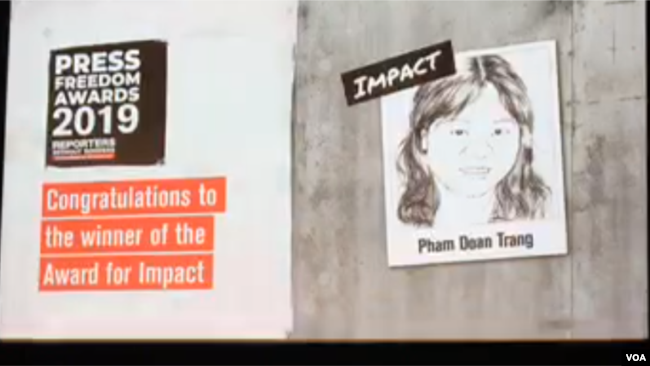Locals and the international community were outraged with the 9 year prison term received by well-known Vietnamese journalist Pham Doan Trang.
Title: Vietnamese Critics, Others Slam Journalist’s 9-Year Sentence
Publish Date: January 6, 2022
Publisher: Voice of America
Excerpt:
HANOI, VIETNAM —
The Dec. 14 sentencing of Vietnamese journalist Pham Thi Doan Trang, commonly known as Pham Doan Trang, to nine years in prison for “spreading anti-state propaganda” has angered members of the public here as well as observers outside the country.
Trang regularly published information alleging human rights violations and police brutality. She was arrested in October 2020. She has been one of the most vocal critics of Vietnam’s human rights record in recent years.
The arrest came just hours after the 24th annual U.S.-Vietnam Human Rights Dialogue in Hanoi.
“The sentence is too heavy,” said Minh Pham, a media specialist in Ho Chi Minh City who argued that Trang did not deserve such a long sentence.
“This sort of trial made me more cautious about speaking and expressing my views in the press and on social media in the future. I feel insecure. It is better to avoid talking about political issues, because regardless of the degree of difference in opinion, it will be labeled as an ‘anti-national’ act,” he told VOA.
Similarly, Oanh Vu, who works in the food and beverage industry, said Vietnam still has a long way to go when it comes to freedom of expression.
She told VOA, “Trang’s case has become a sad story as we are heading to the end of this year. But anyway, it is optimistic to see some people are still supporting her and other political prisoners as well. They called for donations to give them [the prisoners] Tet gifts, and provide assistance for their families in their absence. It is also a very practical way to support and help.”
A freelance journalist, who asked not to be named, told VOA he thought Trang’s heavy sentence could be a message to others, since the government may not be able to arrest all the dissidents just because of what they write on social media.
“I think they may use Trang to warn others … with the hope that other journalists or dissidents will see what happened to Trang and decide to step back,” he said.
Zachary Abuza, a professor of Southeast Asia studies at the National War College in Washington, also sees a larger purpose in the handling of Trang’s case.

“The government can’t go and arrest every dissenter or person who makes an anti-government post on Facebook,” he told VOA. “The government is really trying to be very strategic in going after the most influential individuals. They try to figure out who is influencing others and hope that that serves as a deterrent.”
The Trang case spurred several foreign governments to express concern about the human rights situation in Vietnam, although the country has maintained a good relationship with the United States and the European Union. Currently, Vietnam is trying to persuade EU members to ratify an investment protection agreement, in addition to an EU free trade agreement that has been ratified.
However, a Dec. 16 statement by the EU spokesperson called for Trang’s release.
Download: